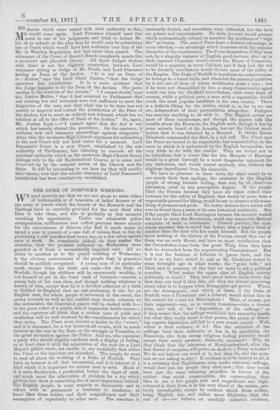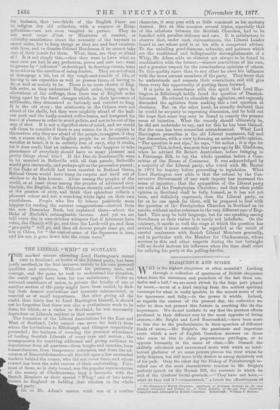THE DUKE OF NORFOLK'S WEDDING.
WE need scarcely say that we are not about to write either of bridesmaids or of bracelets, of ladies' dresses or of the array of jewels which the friends of the Howards and the
Hastings have so carefully provided for the next thief who likes to take them, and who is probably at this moment
watching his opportunity. Under our admirable police arrangements, millionaires now collect precious stones mainly for the convenience of thieves, who find it much easier to spend a year in pursuit of a case full of rubies, than to live by purloining a silk handkerchief every day, or a few silver spoons once a week. So completely indeed do they realise the situation, that the presents collected on Wednesday were guarded as if from a momentarily expected raid. All we desire to mention as to the grand wedding of Wednesday is the obvious contentment of the people that 'ts grandeur should be publicly recognised. A young man of no particular mark, except from his birth and rank—for the Duke of Norfolk, though his children will be enormously wealthy, is not himself as yet in the front rank of fortunes—marries a young lady of his own class, and though nothing whatever is known of him, except that he is a devoted adherent of a faith so disliked in England that no one professing it sits for an English seat, the whole people is interested in the event, the penny journals as well as the costlier ones devote columns to the ceremonial, the illustrated papers will be choked with it—. to the great relief of a public sick of impossible battle-scenes- and the reporters all think that a certain tone of pride and exultation will be well received by the constituencies for which they write. The Times even devotes a leader to the "event," and it is discussed, for a few hours at. all events, with as much interest as the war in the East, or the struggle at Versailles, or the great accusation against the Police. And we, who represent a party who should slightly condemn such a display of feeling, or at least class it with the admiration of the mob for a Lord Mayor's gilded coach, are unable to say truthfully that either the Times or the reporters are mistaken. The people do want to read all about the wedding of a Duke of Norfolk. They have an interest in all that ceremonial, and it is interest of a kind which it is important for serious men to note. Much of it is mere flunkeyisin, a prostration before the signs of rank, and much more the admiration of children for a toy which glitters, but there is something else of more importance behind. The English people, in some respects so democratic and in others with so permanent a tendency to insolence, at heart likes these nobles, and their magnificence and their
assumption of superiority to other men. The assertion is
which systematically refused to mention the incidents of" high life" as events. The sons of Peers have a distinct advantage in every election,—an advantage which increases with the popular character of the constituency. The Peers themselves, if they were not, by a singular instance of English good-fortune, shut up in their separate Chamber, would crowd the House of Commons, would be a majority in every Cabinet, and if they had the wit to be decently conciliatory would dictate most of the policy of the Empire. The Duke of Norfolk is in politics an unknown man, he belongs to a hated faith, and whatever his personal qualities, he is not one of those of whom multitudes make a hero ; but if he were not disqualified by law, a sharp Conservative agent would run him for Sheffield nevertheless, with every hope of success, while a political peer, a man with a reputation, would crush the most popular candidate in his own county. There is a definite liking for the nobles, which is, as far as we can see, independent of their personalities altogether. Pedigree has scarcely anything to do with it. The English nobles are most of them mushrooms, and though the papers talk like heralds about the Howards, the English mob, though it has by some miracle heard of the Armada, has not the faintest recol- lection that it was defeated by a Howard. It thinks Queen Elizabeth commanded the fleet, in a tall ruff. The Times says the Peers are bound to be respectable, but respectability, in the sense in which it is understood by the English bourgeoisie, has very little to do with the matter. They are bound not to be ridiculous, but a viveur like the late Marquis of Hastings would in a great borough be a most dangerous opponent for any statesman, and would unseat anybody else, without the slightest impediment from his character.
We have no pleasure in these facts, for what would be to our minds their best apology, the existence in the English people of strong historic feeling, does not, by all observers admission, exist in any perceptible degree. If the people liked the Percies because they have six times risked their fortunes for the safety of England, that would be more than a respectable ground for liking, would be one to observe with some- thing of pleasure and pride. No better defence for a nation will ever be found than a sense of its own historical continuity. Nor if the people liked Lord Harlington because his ancestor staked his head to carry the Revolution, could any reasonable Radical
complain of such a sentiment. Cceteris paribus, the man whose ancestor has so acted has before him a higher ideal of conduct than the man who has made himself. But the people know nothing of the history of the Percies, except that one of them was an early Murat, and have no more recollection that the Cavendishes come from the great Whig than they have that he descended from the sequestrating Commissioner. But it is not the business of Liberals to ignore facts, and the fact is as we have stated it, and as Mr. Gladstone stated it, some fortnight ago in other words ; the "great folks" are liked, and in presence of the fact we want to ask a political question. What makes the upper class of English society politically so timid ? They have proof before them every day that they can lead if they like, yet they are always quavering about what is to happen when demagogues get power. Where are the demagogues, and which of them, if the Duke of Norfolk were a Protestant and a Liberal, would defeat him in the contest for a seat for Birmingham ? They, of course, put their argument—say, as to county franchise—into a decent form, and talk of the "degradation of the suffrage," as if they meant that the suffrage would fall into unworthy hands, but what they really dread is that power, the power of direct-
ing organic legislation, will fall to a new couche sociale. Well,
where is their evidence of it? Has the reduction of the suffrage hurt their influence, or has it, by paralysing the Dissenters, who from strong religious feeling probably would escape their social pressure, distinctly increased ? Why do they think that the labourers of Northumberland, after the first flutter of surprise, will prefer an Arch to a Percy as leader? We do not believe one word of it, but they do, and the ques- tion we are asking is, why ? If evidence is to be trusted at all, it is a certainty that Englishmen, even under universal suffrage,
would elect just the people they elect now ; that they would have just the same admiringprejudice in favour of the
nobles ; that social conservatism, the conservatism that likes to see a few people rich and magnificent and high- coloured in their lives, is in the very blood of the nation, per- fectly ineradicable, except by conduct which those nobles, being English too, and rather more Philistine than the rest of us—we believe, on carefully collected evidence, for instance, that two-thirds of the English Peers are in religion dry old orthodox, with a soupcon of Evan- gelicalism—are not even tempted to pursue. They do not want coups d'C'tat, or Ministries of combat, or rubbishy manifestoes about the necessity of the bayonet to moral order, but to keep things as they are and lead comfort- able lives, and to dismiss Colonel Henderson if he cannot take care of their jewels for them. What, then, are they so afraid of ? Is it not simply this,—that they want to have what no man ever yet had in any perfection, power and ease too ; want to govern by " influence " as developed in drawing-rooms, want to avoid even the exertion of being leaders, They are not afraid of demagogy a bit, but of the rough-and-tumble of life, of having to use capacities as well as possess them, of having to do as well as merely to be. There is no more chance of Eng- lish order, as they understand English order, being upset by alterations of the suffrage, than there was of English order being upset by the fiscal changes which, in their ignorance of arithmetic, they denounced so furiously and resisted so long. It is the old story ; the aristocrats in the Crimea were not afraid of the shells, but they were mightily afraid of the half- raw pork and the badly-roasted coffee-beans, and hungered for leave of absence in order to avoid pallets, and not to be out of the way of shot. It is not a dignified state of mind, and we would ask them to consider if there is any reason for it, to explain to themselves why they are afraid of the people,to suggest, if they can, a reason why, if the English people be so democratic or socialist at heart, it is so entirely free of envy, why it exults, for it does exult, that an unknown noble who happens to take precedence of everybody should have so many pleasant and pretty things about him ? If the Due de Doucleauville were te be married in Belleville with all that parade, Belleville would grin ominously, and perhaps spit as the procession passed ; if the Duke of Norfolk had been married in Bethnal Green, Bethnal Green would have hung its carpets and itself out of window to do him honour. Alone among the peoples of the world, or at least alone among the peoples of advanced civi- lisation, the English, as Mr. Gladstone recently said, are devoid of the passion of envy, and think that splendour reflects a pleasant colour and not a searching white light on their own squalidness, People who live by labour positively seem happier for reading the current exaggerations—derived from the new Domesday Book, but explained there—about the Duke of Norfolk's unimaginable income. And yet we are told every day in awe-stricken whispers that if labourers have votes, the Church will go, and then the Lords will go, and then " pro-putty " will go, and then all decent people must go, and live in China, for "the coat-of-arms of the Squeerses is tore, and his sun is gone down into the ocean wave."







































 Previous page
Previous page